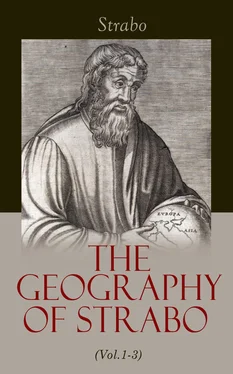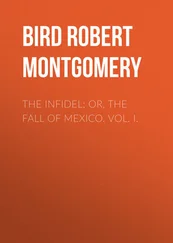Table of Contents
1. What remains [to be described] of Iberia, is the sea-coast of the Mediterranean from the Pillars to the Pyrenees, and the whole of the inland country which lies above. The breadth of this is irregular, its length a little above 4000 stadia. It has been remarked that the sea-coast 1160is above 2000 stadia, and they say that from Mount Calpe, 1161which is near the Pillars, to New Carthage, 1162there are 2200 stadia. This coast is inhabited by the Bastetani, also called the Bastuli, and in part by the Oretani. Thence 1163to the Ebro the distance is nearly as great. This [region] is inhabited by the Edetani. On this side the Ebro to the Pyrenees and the Trophies of Pompey there are 1600 stadia. It is peopled by a small portion of the Edetani, and the rest by a people named the Indicetes, divided into four cantons.
2. Commencing our particular description from Calpe, there is [first] the mountain-chain of Bastetania and the the Oretani. This is covered with thick woods and gigantic trees, and separates the sea-coast from the interior. In many places it also contains gold and other mines. The first city along the coast is Malaca, 1164which is about as far distant from Calpe as Calpe is from Gades. 1165It is a market for the nomade tribes from the opposite coast, and there are great stores of salt-fish there. Some suppose it to be the same as Mænaca, which tradition reports to be the farthest west of the cities of the Phocæi; but this is not the case, for Mænaca, which was situated at a greater distance from Calpe, is in ruins, and preserves traces of having been a Grecian city, whereas Malaca is nearer, and Phœnician in its configuration. Next in order is the city of the Exitani, 1166from which the salted fish 1167bearing that name takes its appellation.
3. After these comes Abdera, 1168founded likewise by the Phœnicians. Above these places, in the mountains, the city of Ulyssea 1169is shown, containing a temple to Minerva, according to the testimony of Posidonius, Artemidorus, and Asclepiades the Myrlean, 1170a man who taught literature in Turdetania, and published a description of the nations dwelling there. He says that in the temple of Minerva were hung up spears and prows of vessels, monuments of the wanderings [Pg 236] [CAS. 157] of Ulysses. That some of those who followed Teucer in his expedition settled among the Gallicians; 1171and that two cities were there, the one called Hellenes, 1172the other Amphilochi; but Amphilochus 1173having died, his followers wandered into the interior. He adds, that it is said, that some of the followers of Hercules, and certain also of the inhabitants of Messene, settled in Iberia. Both he and others assert that a portion of Cantabria was occupied by Laconians. Here is the city named Opsicella, 1174founded by Ocela, 1175who passed into Italy with Antenor and his children. Some believe the account of the merchants of Gades, asserted by Artemidorus, that in Libya there are people living above Maurusia, near to the Western Ethiopians, named Lotophagi, because they feed on the leaves and root of the lotus 1176without wanting to drink; for they possess [no drink], being without water. These people they say extend as far as the regions above Cyrene. There are others also called Lotophagi, who inhabit Meninx, 1177one of the islands situated opposite the Lesser Syrtes. 1178
4. No one should be surprised that the poet, in his fiction descriptive of the wanderings of Ulysses, should have located the majority of the scenes which he narrates without the Pillars, in the Atlantic. For historical events of a similar character did actually occur near to the places, so that the other circumstances which he feigned did not make his fiction incredible; nor [should any one be surprised] if certain persons, putting faith in the historical accuracy and extensive knowledge of the poet, should have attempted to explain the poem of Homer on scientific principles; a proceeding undertaken by Crates of Mallos, 1179and some others. On the other hand, there have been those who have treated the undertaking of Homer so contemptuously, as not only to deny any such knowledge to the poet, as though he were a ditcher or reaper, but have stigmatized as fools those who commented on his writings. And not one either of the grammarians, or of those skilled in the mathematics, has dared to undertake their defence, or to set right any mistakes in what they have advanced, or any thing else; although it seems to me possible both to prove correct much that they have said, and also to set right other points, especially where they have been misled by putting faith in Pytheas, who was ignorant of the countries situated along the ocean, both to the west and north. But we must let these matters pass, as they require a particular and lengthened discussion.
5. The settlement of the Grecians amongst these barbarous nations may be regarded as the result of the division of these latter into small tribes and sovereignties, having on account of their moroseness no union amongst themselves, and therefore powerless against attacks from without. This moroseness is remarkably prevalent amongst the Iberians, who are [Pg 238]
[CAS. 158] besides crafty in their manner, devoid of sincerity, insidious, and predatory in their mode of life; they are bold in little adventures, but never undertake any thing of magnitude, inasmuch as they have never formed any extended power or confederacy. If they had had but the will to assist each other, neither could the Carthaginians by making an incursion have so easily deprived them of the greater part of their country, nor before them the Tyrians, then the Kelts, now called the Keltiberians and Berones, nor after these the brigand Viriathus, and Sertorius, 1180nor any others who desired power. On this account the Romans, having carried the war into Iberia, lost much time by reason of the number of different sovereignties, having to conquer first one, then another; in fact, it occupied nearly two centuries, or even longer, before they had subdued the whole.—I return to my description.
6. After Abdera 1181is New Carthage, 1182founded by Asdrubal, who succeeded Barcas, the father of Hannibal. It is by far the most powerful city of this country, being impregnable, and furnished with a noble wall, harbours, and a lake, besides the silver mines already mentioned. The places in the vicinity have an abundance of salted fish, and it is besides the great emporium of the sea merchandise for the interior, and likewise for the merchandise from the interior for exportation. About midway along the coast between this city and the Ebro, we meet with the outlet of the river Xucar, 1183and a city bearing the same name. 1184It rises in a mountain belonging to the chain which overlooks Malaca, 1185and the regions around Carthage, and may be forded on foot; it is nearly parallel to the Ebro, but not quite so far distant from Carthage as from the Ebro. Between the Xucar and Carthage are three small towns of the people of Marseilles, not far from the river. Of these the best known is Hemeroscopium. 1186On the promontory there is a temple to Diana of Ephesus, held in great veneration. Sertorius used it as an arsenal, convenient to the sea, both on account of its being fortified and fitted for piratical uses, and because it is visible from a great distance to vessels approaching. It is called Dianium, 1187from Diana. Near to it are some fine iron-works, and two small islands, Planesia 1188and Plumbaria, 1189with a sea-water lake lying above, of 400 stadia in circumference. Next is the island of Hercules, near to Carthage, and called Scombraria, 1190on account of the mackerel taken there, from which the finest garum 1191is made. It is distant 24 stadia from Carthage. On the other side of the Xucar, going towards the outlet of the Ebro, is Saguntum, founded by the Zacynthians. The destruction of this city by Hannibal, contrary to his treaties with the Romans, kindled the second Punic war. Near to it are the cities of Cherronesus, 1192Oleastrum, and Cartalia, and the colony of Dertossa, 1193on the very passage of the Ebro. The Ebro takes its source amongst the Cantabrians; it flows through an extended plain towards the south, running parallel with the Pyrenees.
Читать дальше












![Anne Blunt - A Pilgrimage to Nejd, the Cradle of the Arab Race. Vol. 2 [of 2]](/books/750183/anne-blunt-a-pilgrimage-to-nejd-the-cradle-of-the-thumb.webp)